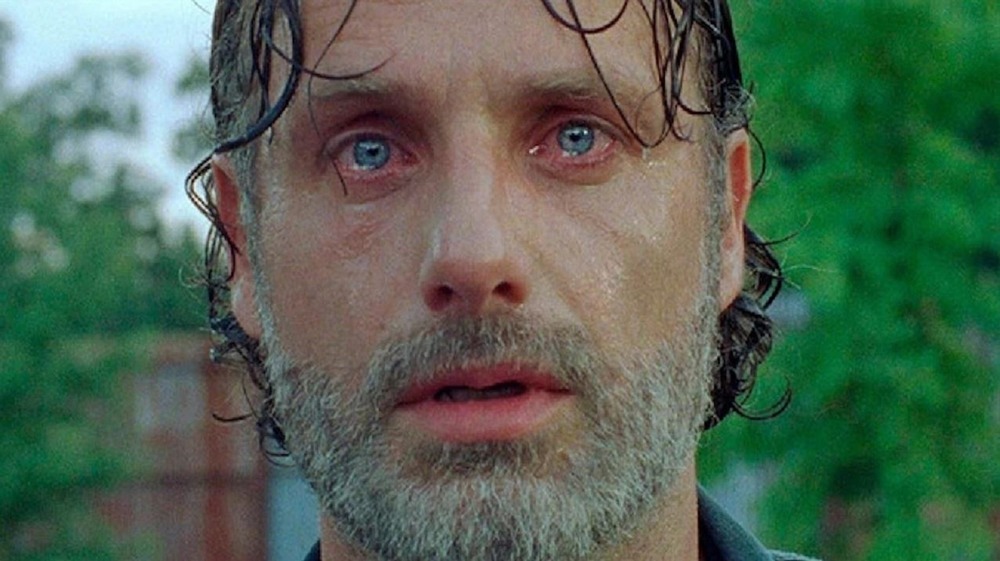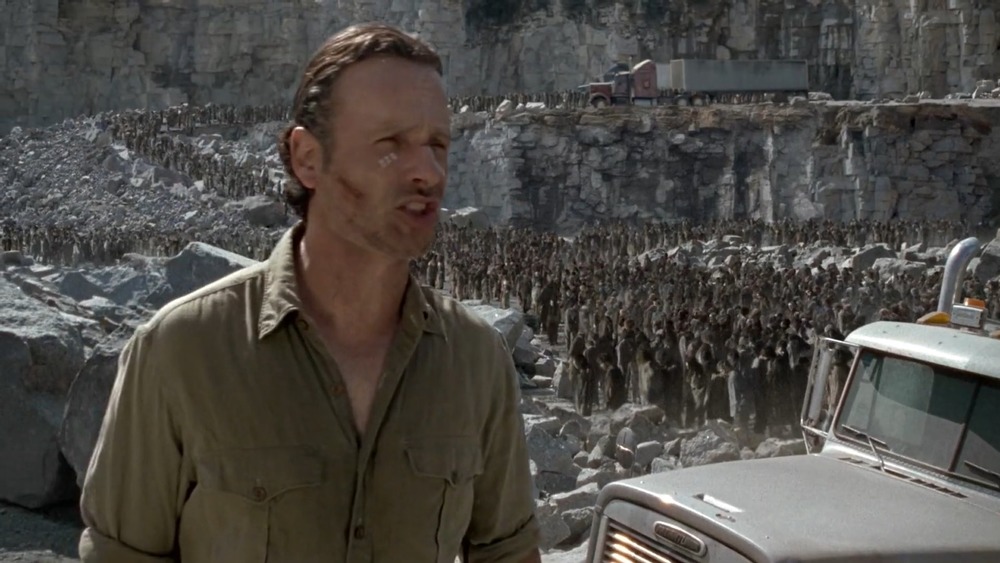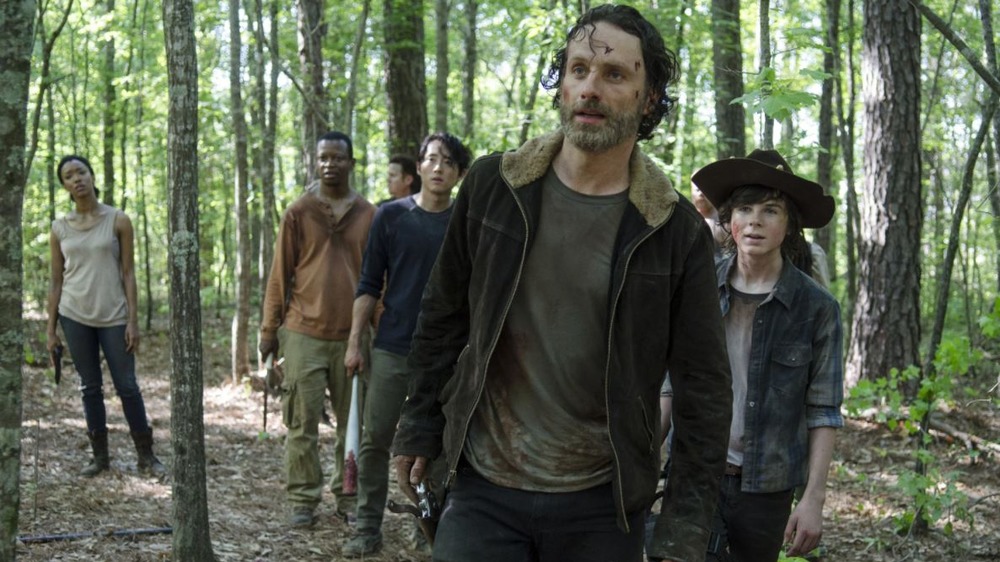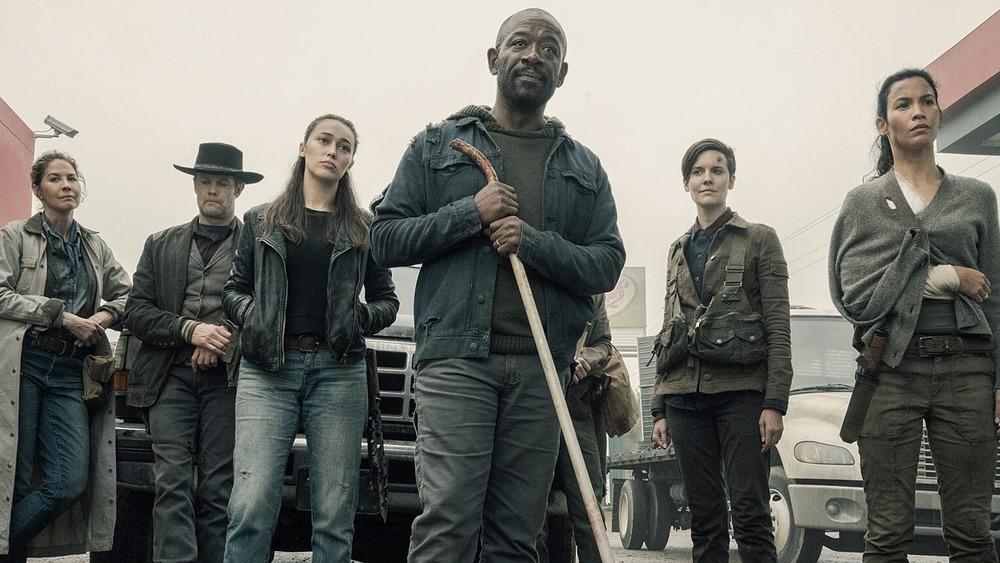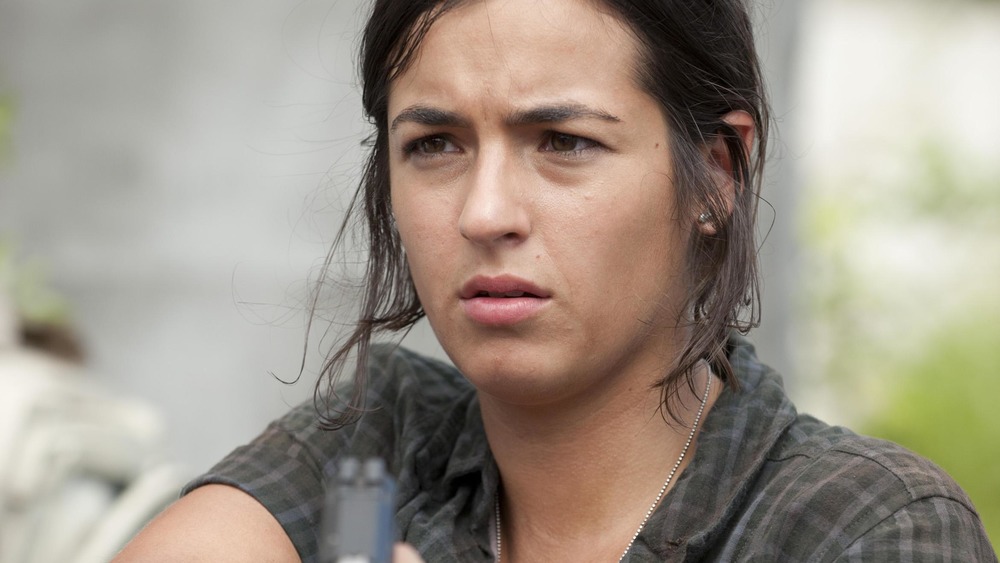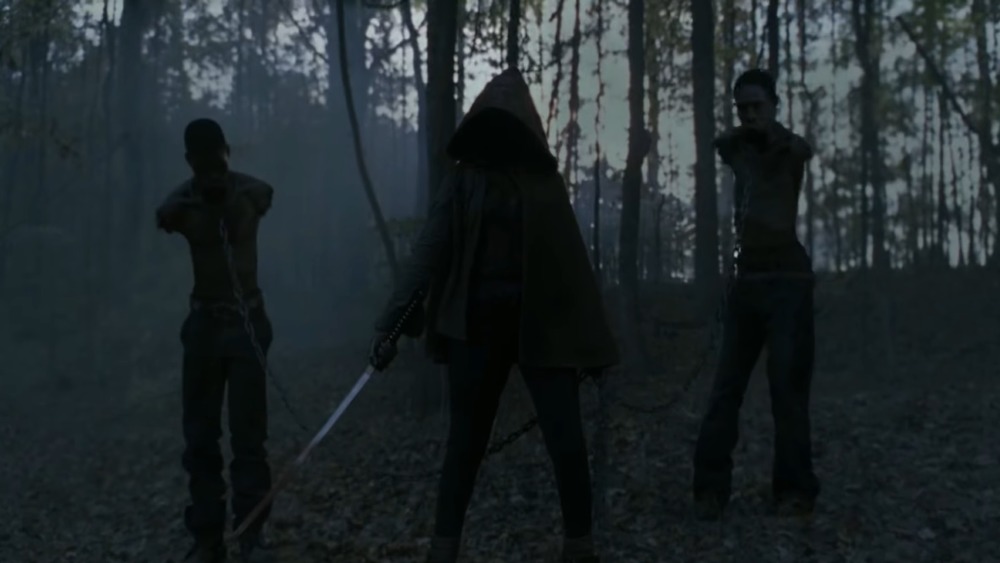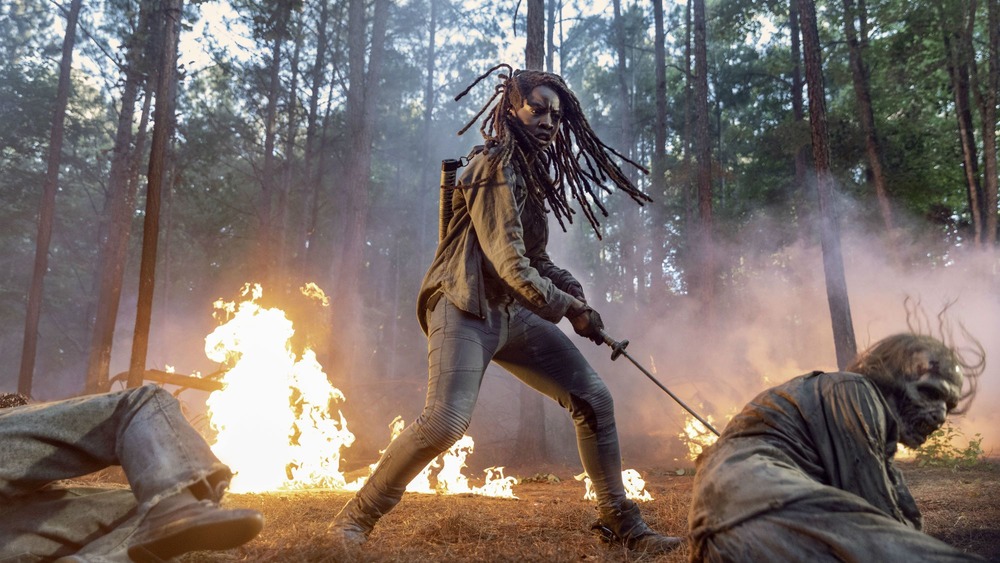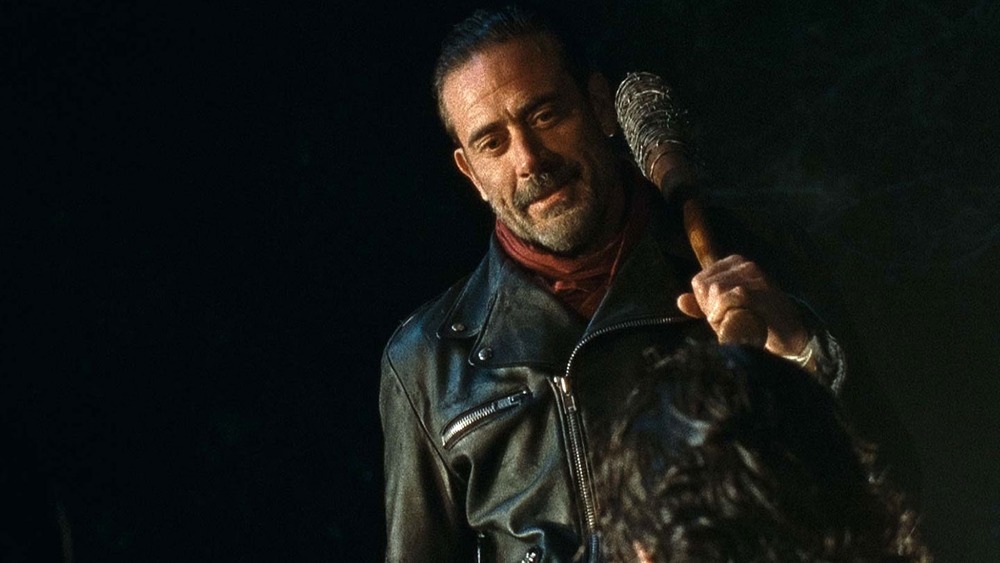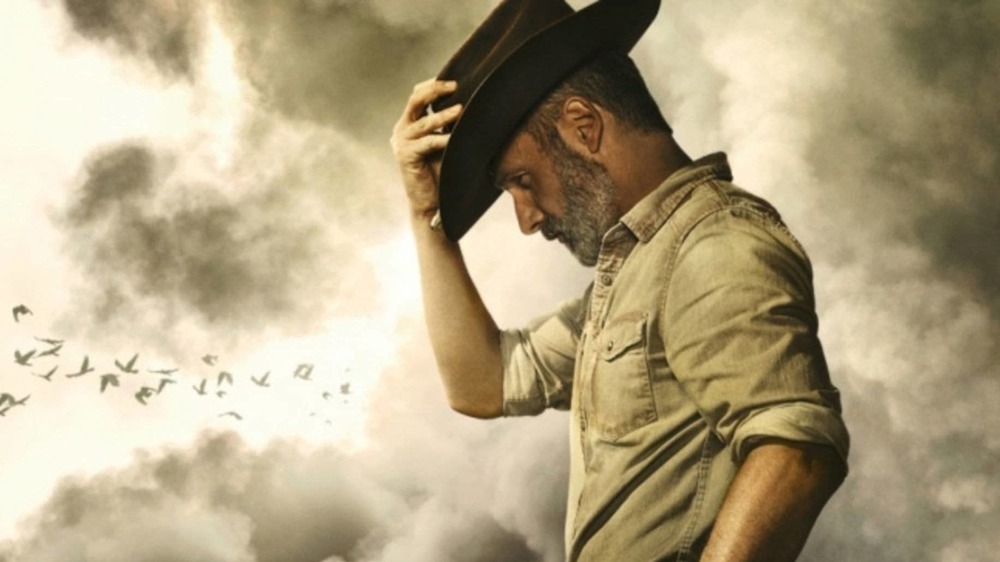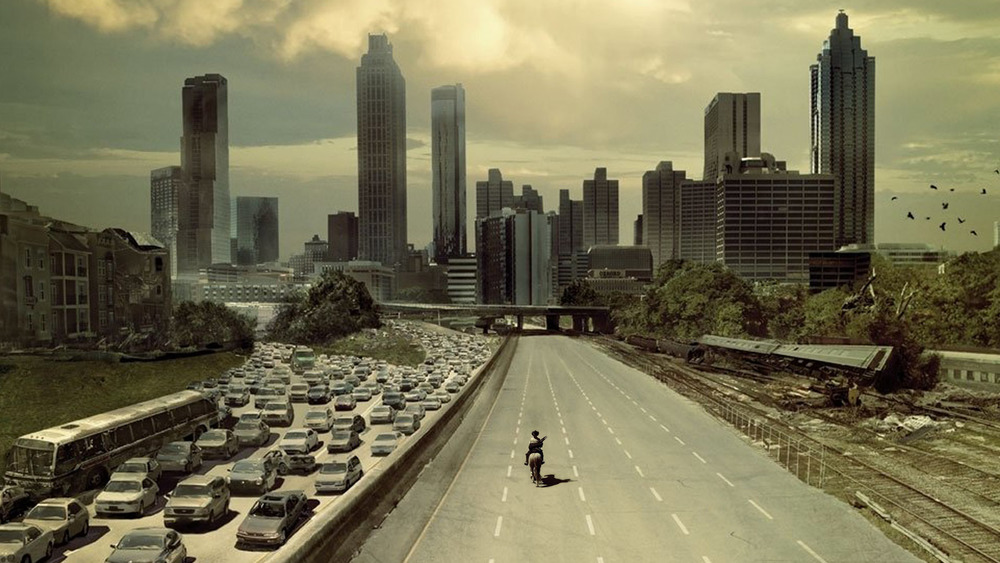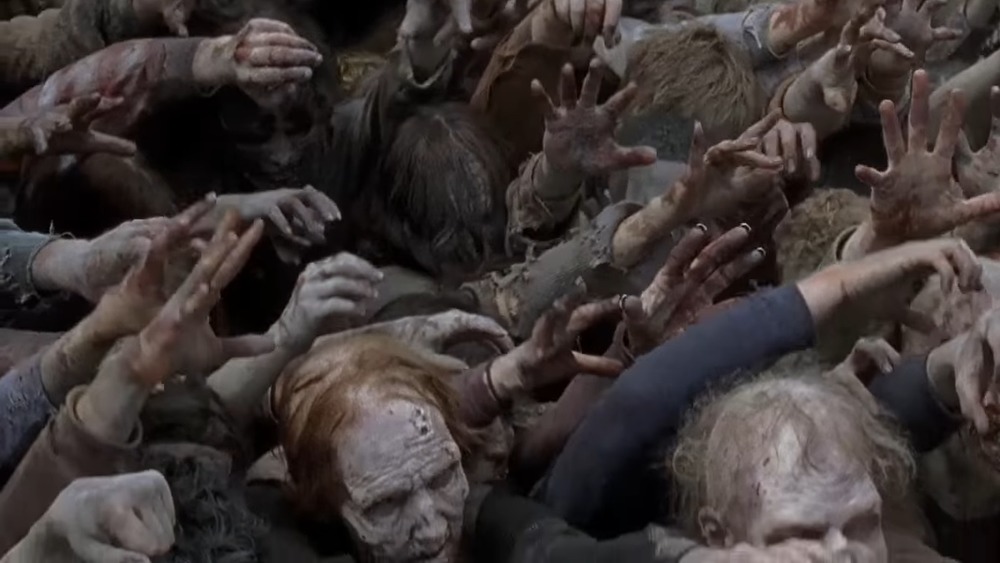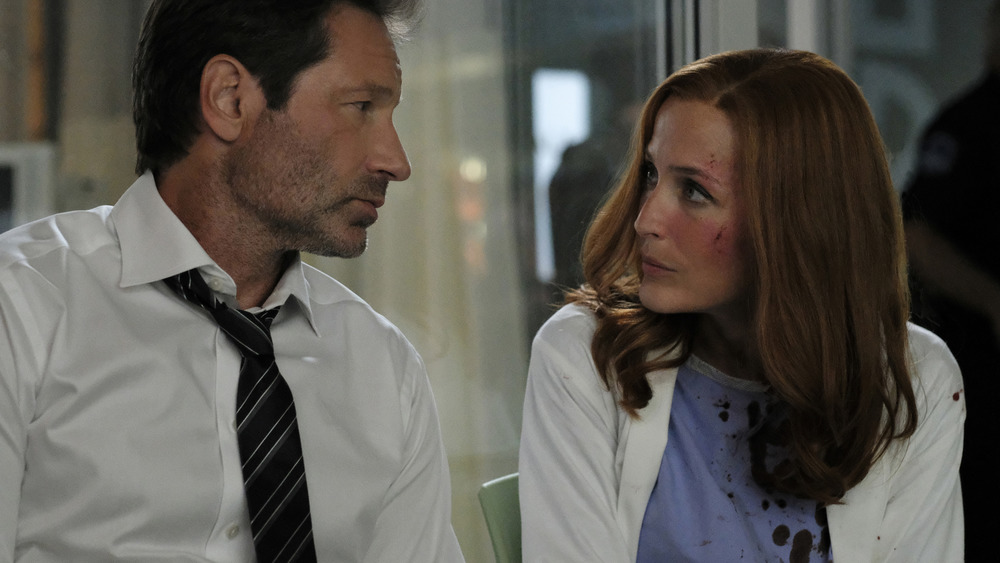Unpopular Opinions About The Walking Dead That Raise Good Points
Based on the comic book series by Robert Kirkman, The Walking Dead has been staggering its way through pop culture ever since 2010. It was once one of the most-watched series on cable television, and while these days, it certainly can't claim the status of "cultural phenomenon" that it could during its imperial phase, it's still doing well enough to ensure the financial security of stars like Norman Reedus and Melissa McBride, as well as their immediate descendants and possibly even their grandchildren and great-grandchildren.
In other words, The Walking Dead (TWD) is a certified television classic. But everybody's got an opinion, right? And if everyone has one, that means there are literally millions, maybe billions, of opinions about this undead series ... and they can't possibly all be positive. Sure, maybe these scathing takes annoy dedicated fans, but some of these critiques actually make pretty good points. So, we've gathered a few thoughts with which ride-or-die TWD viewers might not agree, but nevertheless, they're definitely worth considering. After all, no TV show — even one with zombies, a katana-wielding warrior, and a tiger-loving king — is perfect.
The Walking Dead must end with walkers killing and eating the entire cast
We're definitely not the first to notice that TWD plays like an inverted Star Trek. According to the imagination of Gene Roddenberry, post-current civilization humanity cooperates, prospers, and revels in scientific advancement and exploration. Meanwhile, people in TWD form tribes and go to war against each other, instead of pooling their resources and working together against an obvious and omnipresent common threat.
Star Trek is optimistic, and TWD goes a step beyond pessimism into full-blown nihilism. For Rick, Daryl, Carol, Maggie, and whoever's left of the gang, their victories don't really matter because they live in a world that's already been conquered by walkers. They just survive terrible things in order to survive more terrible things.
Therefore, if the flagship TWD series ends with anything other than all the characters becoming dinner, TWD will have betrayed its central themes of futility and doom. If TWD has a happy ending, well, that would be like abruptly turning a primary character evil in the penultimate episode. It would feel cheap. Granted, for the finale to unfold in just such a bloodbath, AMC would have to ignore its own financial well-being. The network reportedly paid for Daryl and Carol's continued small-screen presence following the show's upcoming finale in 2022. At the moment, it seems the death of most of the humans is the best we can hope for.
The Walking Dad really only has one story that gets told over and over again
At one point in 2006's Clerks II, the character of Randal Graves (Jeff Anderson) goes on a little diatribe to explain his contempt for the Lord of the Rings trilogy. As he puts it, "All it was was a bunch of people walking." Well, if you add "killing zombies" next to the word "walking" in Randal's rant, it's not an inaccurate description of The Walking Dead.
Okay, we're definitely not saying the show ever got boring. In order to get truly boring, TWD would have to reduce its seasonal body count to a degree that would make it a different show entirely. But we'd wholeheartedly agree that TWD got repetitive.
Rick and the crew struggle against the elements until they find the Greene family farm. Then walkers overrun the farm, and the heroes set out on their own once again. Then they come to the prison, and they live there until walkers take over that one, too. Same deal in Alexandria. In other words, The Walking Dead has a formula, and it sticks to that formula pretty closely. Or as one of Rick Grimes' fellow law enforcement officers once said on a different cable show, "Time is a flat circle."
Does everything need its own shared universe?
If a corporation makes a successful thing — it could be a TV show, film, book, what have you — then its next step will be to recreate whatever that thing happened to be, in hopes of similar monetary rewards. In a vacuum, that's not a bad impulse. It's why film genres exist in the first place. But we've hit a point where big companies fear taking risks on just about anything they don't think is a sure-fire hit.
For proof, look no further than the world of The Walking Dead. After all, Fear the Walking Dead, The Walking Dead: World Beyond, and any other Dead-adjacent television projects in development exist at the expense of an unknowable number of other shows that weren't greenlit because they lacked a perceived built-in audience. And perhaps we shouldn't judge AMC too harshly for its decision-making process because that's also why we got Better Call Saul. But it is worth asking — at what point do we no longer require expansions on a story that gets accused of redundancy and spinning its wheels as often as TWD?
Some Walking Dead fans really need to calm down
Are TWD fans all jerks? Nah! But there's a sizeable minority among the fandom that's pretty scummy.
For proof, look no further than Josh McDermitt's social media experience. The actor has received death threats because some fans dislike the character he plays — the cowardly Eugene. Of course, if McDermitt responded in kind to each and every crazed fan who threatened his life over the actions of an imaginary person he plays on television, then McDermitt would look insane, and that would interfere with his ability to gain further employment as a Hollywood actor. His only other option was to quit social media, and we can't say we blame him.
McDermitt's far from the only TWD cast member to deal with online strife that's entirely uncalled for. Sadly, fans body-shamed Alanna Masterson (Tara), prompting both the actress and costar Steven Ogg (Simon) to strike back, encouraging trolls to "grow up" and "go f*****g do something productive with your life," respectively.
Why doesn't everyone use armless, mouthless walkers to survive?
When Michonne Hawthorne, played by Black Panther's Danai Gurira, first appears at the end of TWD season two, we see her leading around two walkers on leashes, as if they were the worst pets imaginable. Later, we find out that these are the reanimated corpses of her boyfriend and her boyfriend's buddy. Evidently, she mutilated their bodies due to some justified resentment connected to the death of her son. But in the process, Michonne discovered that walkers become docile and harmless once their mouths and arms are removed. Even better, she learned that surrounding herself with armless, mouthless walkers rendered her invisible to actively hostile zombies.
So, why isn't every living person in TWD universe dragging a pair of neutered walkers with them at all times? If there's an effective method of walker deterrent available, why is Michonne the only person who ever uses it, and furthermore, why does she only use it when it's supposed to symbolize her paranoia and isolation?
This is a list of opinions, of course, not "plot holes." It could very well be that citizens of TWD's world don't want to stand next to mutilated walkers 24/7 because that would be a completely disgusting way to live. But once you got used to it, in our opinion, being constantly safe from walkers is worth being constantly grossed out by walkers.
Fire would save the day
Walkers can't resist fire. This is an objective, verifiable fact. When a walker sees fire, that walker hobbles over to get as close as possible to the warm, bright thing, and then they get incinerated shortly thereafter. This happens every time, like clockwork. It's possible walkers love re-dying in fire even more than they love the taste of sweet, fresh people meat.
So let's say, hypothetically, you were attempting to survive in a post-zombie apocalypse wasteland, like the one depicted in TWD. Assuming you knew that the walkers' primary weakness is fire, wouldn't it make sense to build your community around, let's say, an everlasting tire fire? Such a thing is easily created. All you need is a tire yard, knowledge of where a tire yard is located, or failing all that, a large quantity of tires and the means with which to pile them up into a hill-shaped mass. Once you've pulled all that together, you just need gasoline and matches, and voila! You've got a piece of permanent anti-walker architecture.
The major downsides of this arrangement would have to be the unholy smell and the certain long-term damage to the lungs of every citizen of the community that the fire is designed to protect. We're not saying we know for sure this is a good idea, we just don't understand why no one on TWD ever even discusses it.
Sometimes, things get snuffy on The Walking Dead
Let's take a glance back at October 2016. Fans had waited all summer to find out whose skull Negan would shatter at the onset of TWD's seventh batch of episodes. The season premiere started, and we all held on to our butts, anticipating a payoff that would validate all our theories and arguments over who had the best guess. "This will be interesting enough to justify the amount of attention we've already paid to it," we thought. Then, after a bunch of minutes and two commercial breaks, we found out Negan kills Abraham and Glenn.
And it was gory. Really, really gory. Disturbingly so. And there's something strange about the fact that the show made us wait so long, made us debate and wonder and speculate, only to treat us to a truly brutal beatdown that left us all feeling queasy.
Granted, nobody on TWD is ever safe, of course. That looming uncertainty is written into the genre's DNA. But in the lead-up to season seven, the uncertainty gave way to a kind of sadism that one might use to promote a snuff film, and that raises uncomfortable questions. Why were we so excited to watch someone die? Is there something wrong with us? Do we need help? And did the show step over the line with those brutal killings?
Rick Grimes is kinda dull
So, if you tell us Rick Grimes seems like a nice guy, you'll get no argument. The protagonist played by Andrew Lincoln sticks by his friends and family, always tries to do the honorable thing, and all that jazz.
But, perhaps by design, he's not what we'd call a fascinating individual. In fact, as a sheriff's deputy with a wife and child in suburban Georgia, he was apparently living an American cheese on Wonder Bread kind of life before the world ended. Circumstances in the subsequent years inspired considerable intensity from Grimey (as he likes to be called), but there's not a ton else that makes him feel intrinsically unique. He didn't rise out of an abusive relationship like Carol. He's not the most charismatic person in the room at all times, a la Daryl. He isn't an awesome swordsman like Michonne. He doesn't even have a memorable gimmick like Jesus or Ezekiel.
In some respects, he's similar to John Connor in the Terminator franchise. The other characters look to Rick Grimes as a leader, and they clearly draw a tremendous amount of inspiration from his words and deeds. But nobody ever gets all that specific about what, precisely, makes this guy so special. Ultimately, this places Rick Grimes in the same category as Buffy Summers and Jerry Seinfeld — thoroughly effective main characters who are nevertheless bland as dishwater when compared to all of their friends.
We'll never find out how the infection actually started
The Walking Dead premiered in 2010, about a year before the emergence of its contemporaries, Game of Thrones and Once Upon a Time. These ensemble dramas all leaned heavily into their respective genres, and in 2010, they felt designed to fill the void left by Lost, which aired its final episode seven months after TWD started. Lost infamously dangled solutions to the Island's many mysteries inches in front of its audience's proverbial face throughout six seasons. Likewise, the Walking Dead gang's journey in season 1 to the Centers for Disease Control and Prevention led us to assume the origin of the infection that turns every human into a walker, one by one, might be explained at some point.
Since then, a ton of seasons have aired. And in all that time, characters have rarely expressed interest in any big picture beyond immediate necessity, and it seems unlikely that anybody still tuning in expects to find out what started the zombie apocalypse.
One could argue that attaching a clear-cut cause for the end of civilization undercuts the themes of random suffering and mayhem that permeate throughout the rest of TWD. So if TWD never explains where the walker infection came from, it won't be a worse show for allowing its big mystery to go unsolved. In fact, it's probably safer to leave that particular rock unturned, rather than offering up a disappointing explanation that wasn't even needed to begin with.
But still ... that's a little bit of a cop-out, isn't it?
Sometimes, you wanna cheer for the walkers
Zombies are the best. They're gross and dumb, and we all love them. Humans can be unpredictable and untrustworthy. But you always know where you stand with a zombie. Plus, the pop cultural visibility and influence of zombies stands unmatched by any other supernatural monster, except for vampires.
Point being, zombies have been popular for a long time, and after a while, the enjoyment we get from watching films and television shows about zombies shifts into affection for zombies themselves (at least, as long as they stay fictional). And that's when we start asking questions like, "Why don't we ever see situations from the walkers' perspective?" "Aren't they the real heroes of the show? It's called The Walking Dead, after all, not The Stressed-Out Living People With Guns."
That's especially true when we're given reasons to sympathize with the walkers. For example, there's that desiccated woman in the pilot, crawling around without her legs for all eternity. We feel genuinely sorry for this zombie, and we totally get why Rick goes out of his way to put her down. On the flip side, there are often characters we want to see get devoured, from the cowardly Nicholas to the truly annoying Anderson family.
In other words, zombies are easy to cheer for. And we know you're reading this, Walking Dead showrunners. You guys need to do a show where the walkers are the good guys. You don't even have to admit this is where you got the idea. We'll keep the secret.
It's gone on for far too long
As we learned in September of 2020, season 11 of The Walking Dead will be its last. Regardless of how the spinoffs have turned out or will turn out, AMC made a good decision here. In fact, if they made a mistake at all, it was not lopping off TWD's aging head a few years earlier.
In fact, why would AMC ever continue a beloved sci-fi/horror series well after its quality and fan interest started to decline? Did AMC executives not learn the tragic lesson of The X-Files?
When it started in 1993, The X-Files became a surprise pop cultural phenomenon, much like TWD would years later. Also like TWD, The X-Files probably should've tied off all its loose story threads and called it a day sometime around season 5 or 6. Instead, the network dragged it out for nine seasons and two movies, plus a revival years later. Season 10 (2016) and season 11 (2018) aren't complete and total garbage, but their worst entries — particularly the cringe-inducing "My Struggle IV" — are bafflingly terrible to a degree that damages the legacy of the entire series.
In its defense, TWD has never produced an episode as abysmal as "My Struggle IV." But the show won't have officially dodged that bullet until it ends. Calling it quits at season 11 was a good — albeit belated — decision.
